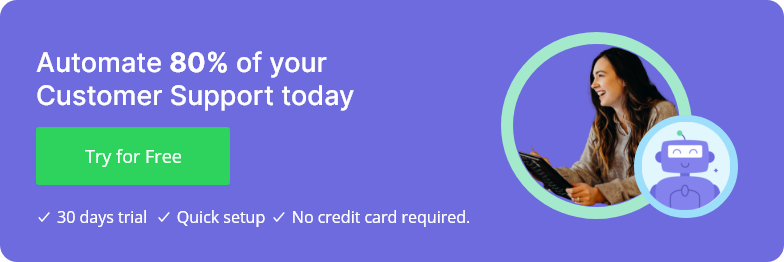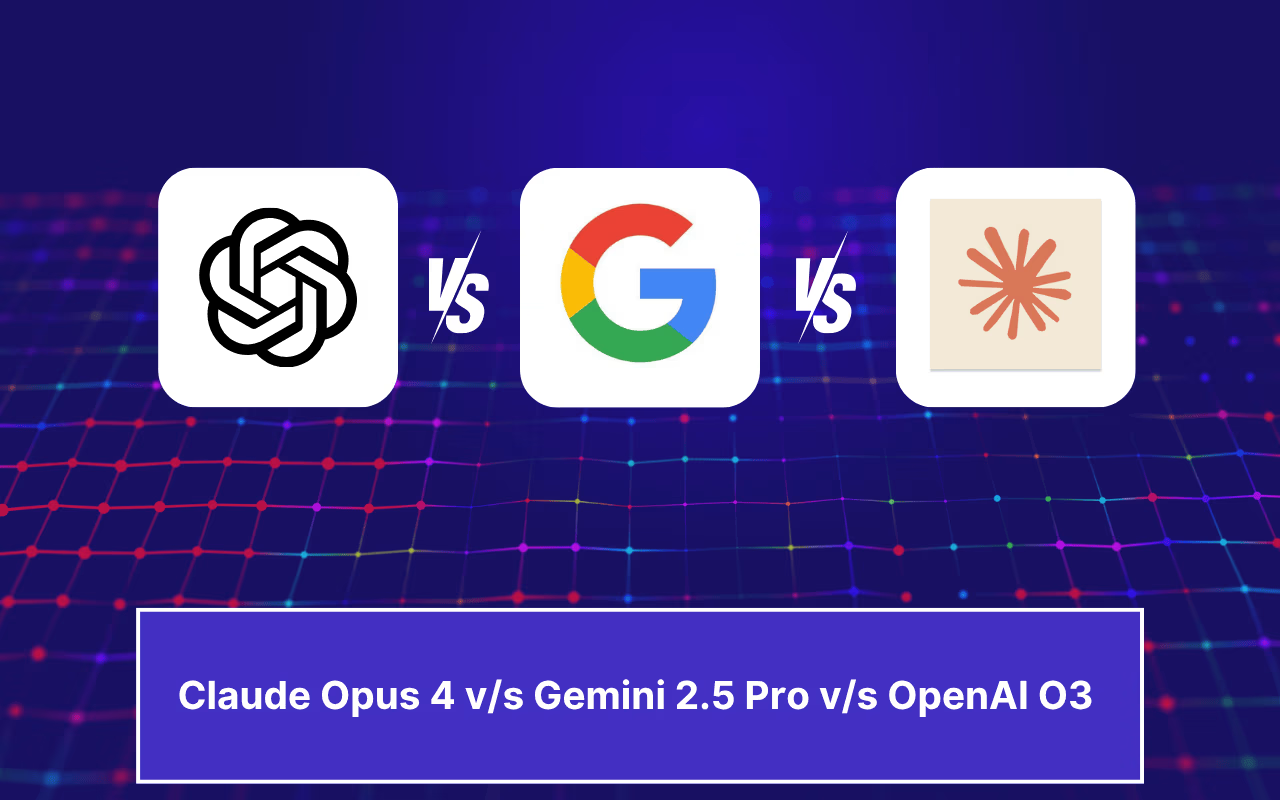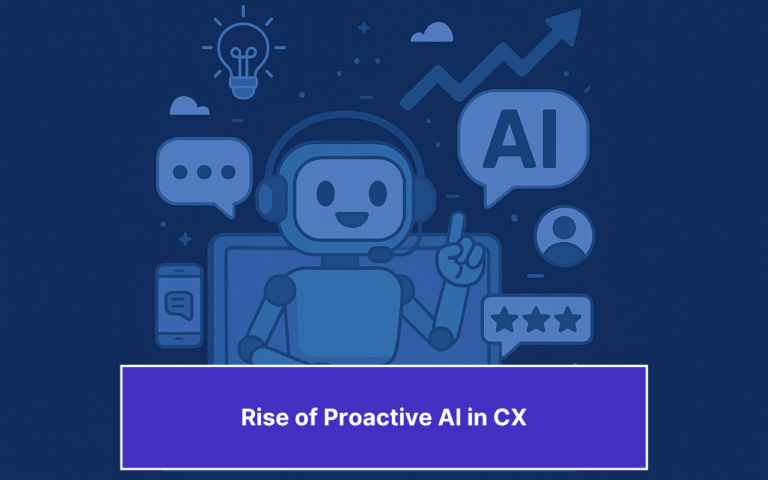Updated on July 10, 2025
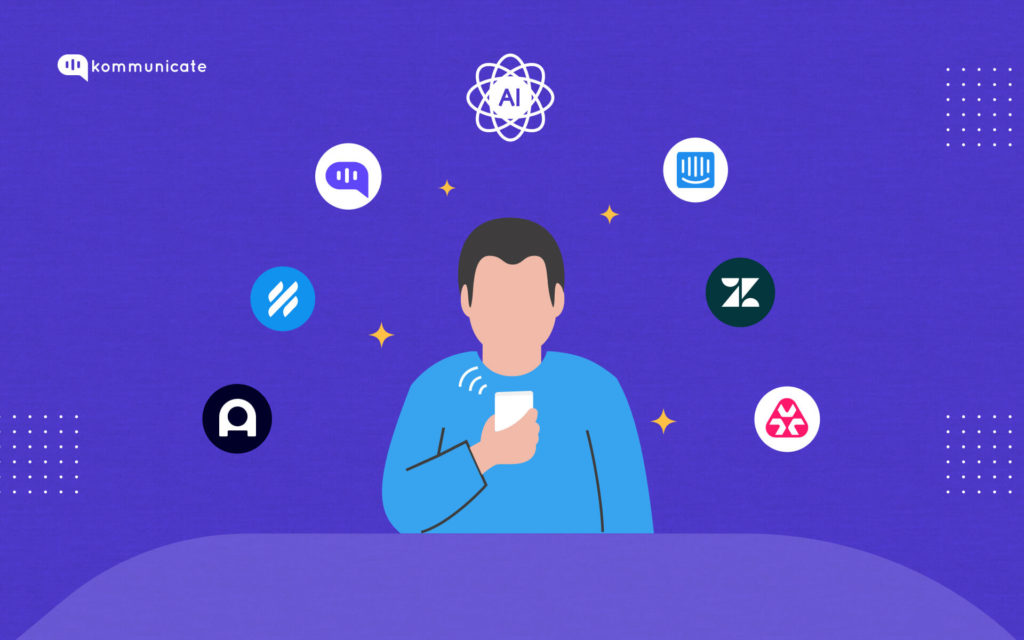
You could have an average product on the market that is selling at satisfactory levels. However, if your customer support is excellent, there is a high probability that your sales graph will grow exponentially in the long term.
On the contrary, you could have a killer product that is outranking competition and selling like hotcakes. But, if your customer support team is limping, the sales graph will plummet sooner or later.
Businesses often fail to deliver great customer service not because they don’t know how, but because they sometimes lack the right team or rely on outdated tools. Providing customer service in any industry is an uphill task – it demands a tremendous amount of time, effort, and resources to handle the constant inflow of customer queries, complaints, and feedback, especially from upset or difficult customers. Leveraging AI customer service systems can help manage this more effectively by automating ticket creation, categorization, and prioritization – reducing manual workload and ensuring faster response times for improved customer satisfaction.
Thanks to the recent growth in AI activity, the customer support function can breathe a sigh of relief. Many businesses, understanding the potential benefits of AI tool for customer support are trying to automate their customer service function.
AI’s power lies in automating rule-based tasks, improving efficiency by reducing manual errors, and enhancing customer satisfaction by delivering instant results. There are countless tools available in the market that can do these tasks for you.
But how do you choose the best AI tool for your customer support team in 2025? There are so many options available in the market, each with its own features, pros and cons, and pricing plans.
Here are some that you can refer to.
1. Kommunicate

Kommunicate is a generative AI-powered customer service automation platform that helps support teams automate customer interactions across email, chat, and voice. It offers more than 40 native integrations with tools like WhatsApp, Instagram, and Telegram, and serves a wide range of industries – from banking and healthcare to education.
Pros:
- No-code generative AI chatbot builder powered by the latest LLMs from OpenAI, Anthropic, and Google.
- Native integrations with Zapier, Zendesk, Salesforce, Freshdesk, HubSpot, Slack, WhatsApp, Telegram, Moodle, and many more.
- Option to train the AI on website pages, documents, and knowledge base articles.
- Ability to train the AI on previous customer conversations, with features like language translation, AI summaries, and AI suggestions for support agents.
Cons:
- The Lite plan offers only basic functionality.
- Lite Plan has limited access to in-depth analytics, extensive integrations, advanced chatbot capabilities
- Businesses may need to upgrade to a paid plan after the 30-day trial to unlock full benefits.
Pricing:
- Starter plan for $40 – Includes 1 AI Agent and 1 user seat with WhatsApp automation, AI email ticketing, and integrations with Dialogflow, Amazon Lex, and IBM Watson.
- Professional plan for $200 – Ideal for teams looking to integrate Kommunicate AI agents across iOS and Android devices. It includes AI agent assist features for customer support agents, such as language translation, summarization, and fetching information from internal tools.
- Enterprise plan – Designed for teams that need advanced capabilities like webhooks and APIs, SSO login, white-label solutions, and unlimited AI chats.

2. Help Scout
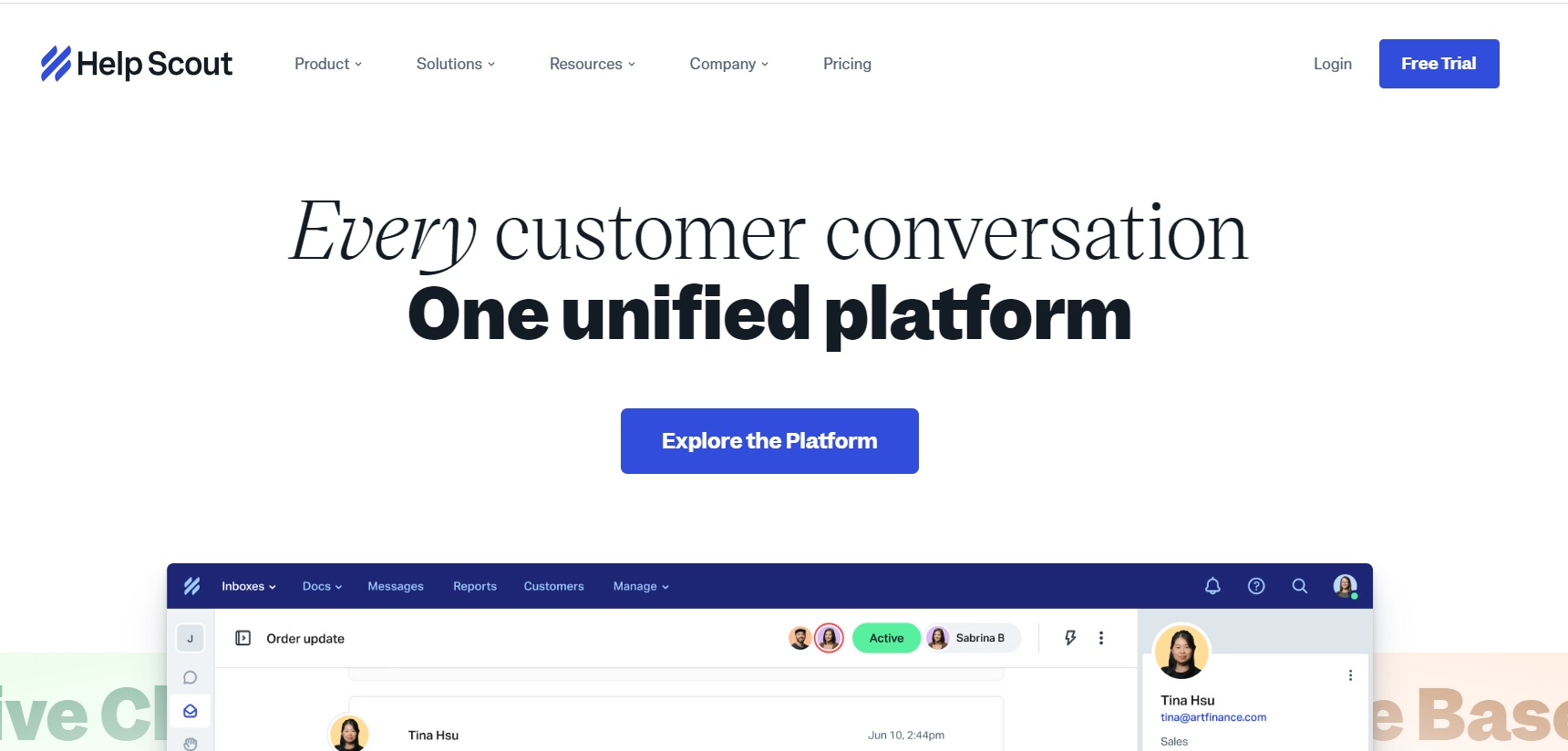
Help Scout is a communication platform and shared inbox that uses AI to help customer service teams deliver personalized and empathetic support across multiple channels.
Highlight AI Features:
- Beacon – A chatbot that can answer FAQs, collect feedback, and suggest relevant articles Workflows – A tool that automates actions based on triggers and conditions
- Satisfaction Ratings – A tool that measures customer happiness and identifies areas for improvement
Pros:
- Boasts of a simple and intuitive user interface that any user can use with relatively no training.
- Offers easy and quick integration with Zapier, Slack, Mailchimp, Shopify, and even specialized revenue recognition tools, streamlining workflows and accelerating data sharing.
- Ranks high on high customer satisfaction rating and a loyal customer base.
Cons:
- Help Scout’s chatbot is not very customizable and may not be able to handle complex queries or scenarios.
- The tool’s reporting and analytics features are limited compared to other alternatives in the market.
- Does not support voice or video calls, which may limit the communication options for some customers.
Pricing:
- Standard plan for $20 per user per month
- Plus plan for $40 per user per month
- Pro plan for $65 per user per month
3. Gorgias
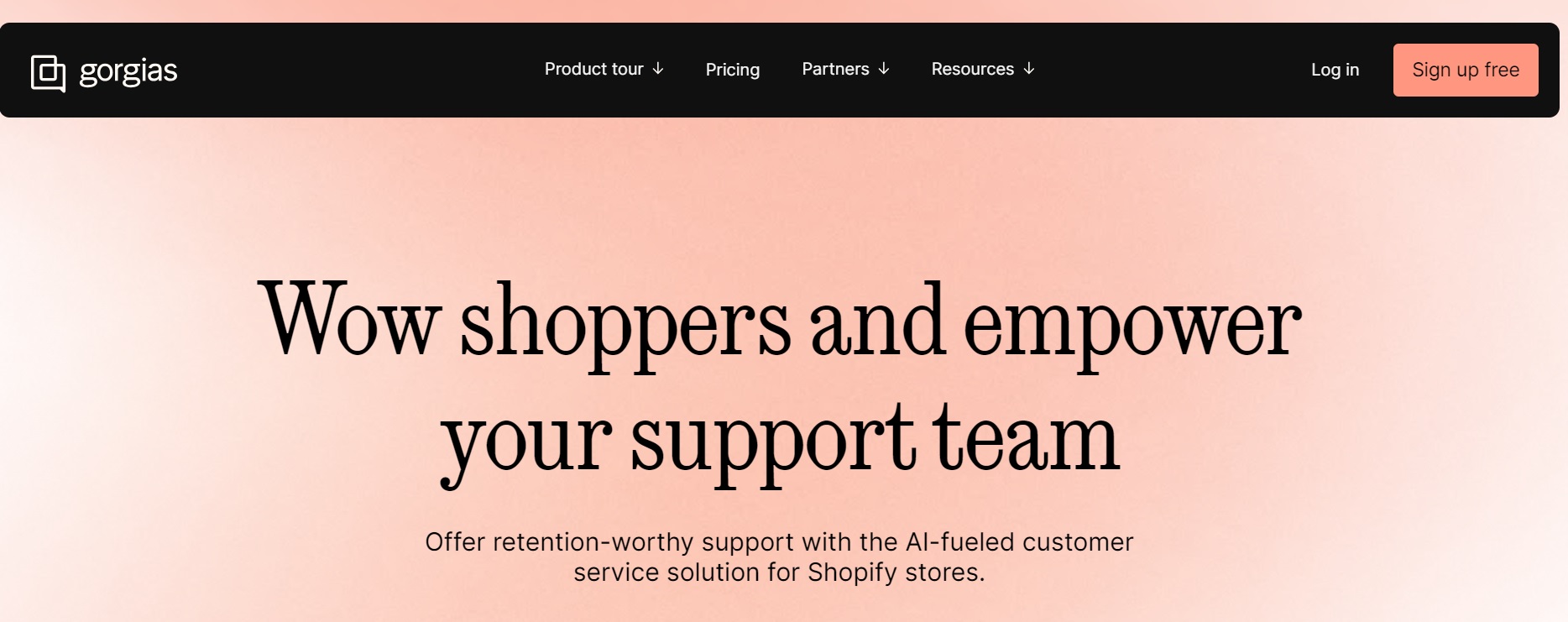
Gorgias is one of the leading help desk software that leverages AI to specifically help eCommerce businesses manage all their customer interactions in a centralized manner.
Highlight features:
- Quick replies – Automatically suggests replies based on previous conversations
- Smart Rules – Automatically assigns tickets, tags, and priorities based on conditions
Pros:
- Provides a powerful and flexible rule engine that allows users to create custom workflows and automations for different scenarios.
- Known for its robust and reliable performance and scalability, handling over 10 million tickets per month.
- Easily integrates with popular eCommerce CMS services like Shopify, Magento, WooCommerce, BigCommerce,etc.
Cons:
- The chatbot has room for improvement and is not equipped with advanced natural language processing or conversational flows.
- May not be for all since it has a steep learning curve and may require some technical skills or knowledge to set up and use effectively.
- The ticket-based pricing rather than user-based pricing adopted by most SaaS businesses might make budget tracking and forecasting difficult
Pricing:
- Free starter plan available on monthly subscription (50 tickets per month)
- Basic plan for $50 per month for up to 300 tickets per month
- Pro plan for $300 per month for up to 2,000 tickets per month
- Advanced plan for $750 per month for up to 5,000 tickets per month
- Custom plan for enterprises with custom tickets volume
4. Tidio
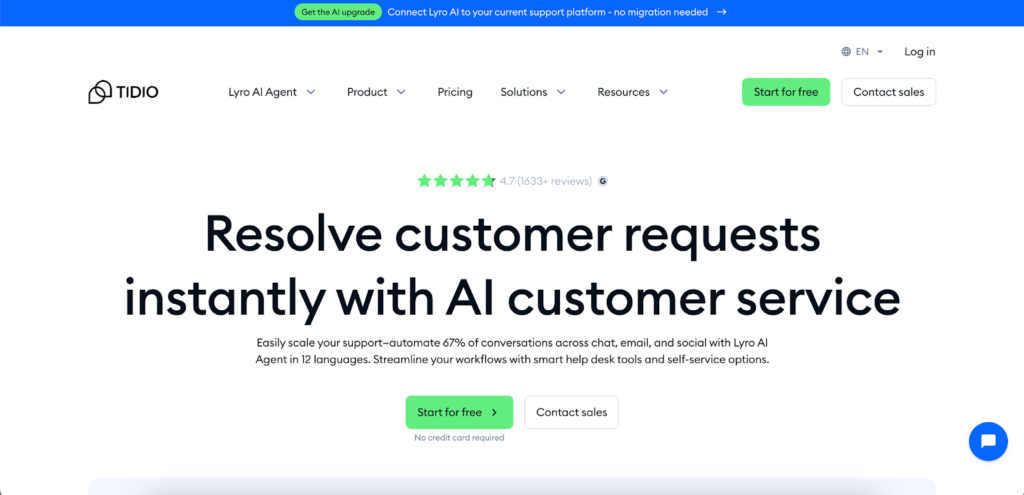
Tidio is an AI-powered customer service solution that helps businesses automate conversations, generate leads, and streamline support across live chat, email, and social media. With a focus on both marketing automation and AI-driven customer service, Tidio supports industries ranging from ecommerce and SaaS to hospitality and education.
Pros:
- AI chatbot Lyro resolves up to 70% of customer inquiries without human intervention.
- Seamless integrations with Shopify, Zendesk, HubSpot, Messenger, Instagram, and WordPress.
- Easy-to-use chatbot builder with pre-built templates for lead generation, product recommendations, and cart recovery.
- Email automation and AI-powered ticket routing for faster responses.
- Visual workflows and multichannel dashboard to unify support and marketing operations.
Cons:
- Some advanced features (like AI training and analytics) require higher-tier plans.
- Limited customization options in the free plan.
Pricing:
- 7-day free trial available
- Free version available
- Starter – $24.17/month
- Growth – Starts at $49.17/month
- Plus – Starts at $749/month
- Premium – Starts at $2999/month
Tidio is ideal for growing businesses that want to combine real-time customer support with smart marketing automation—without switching platforms or writing code.

5. Atera
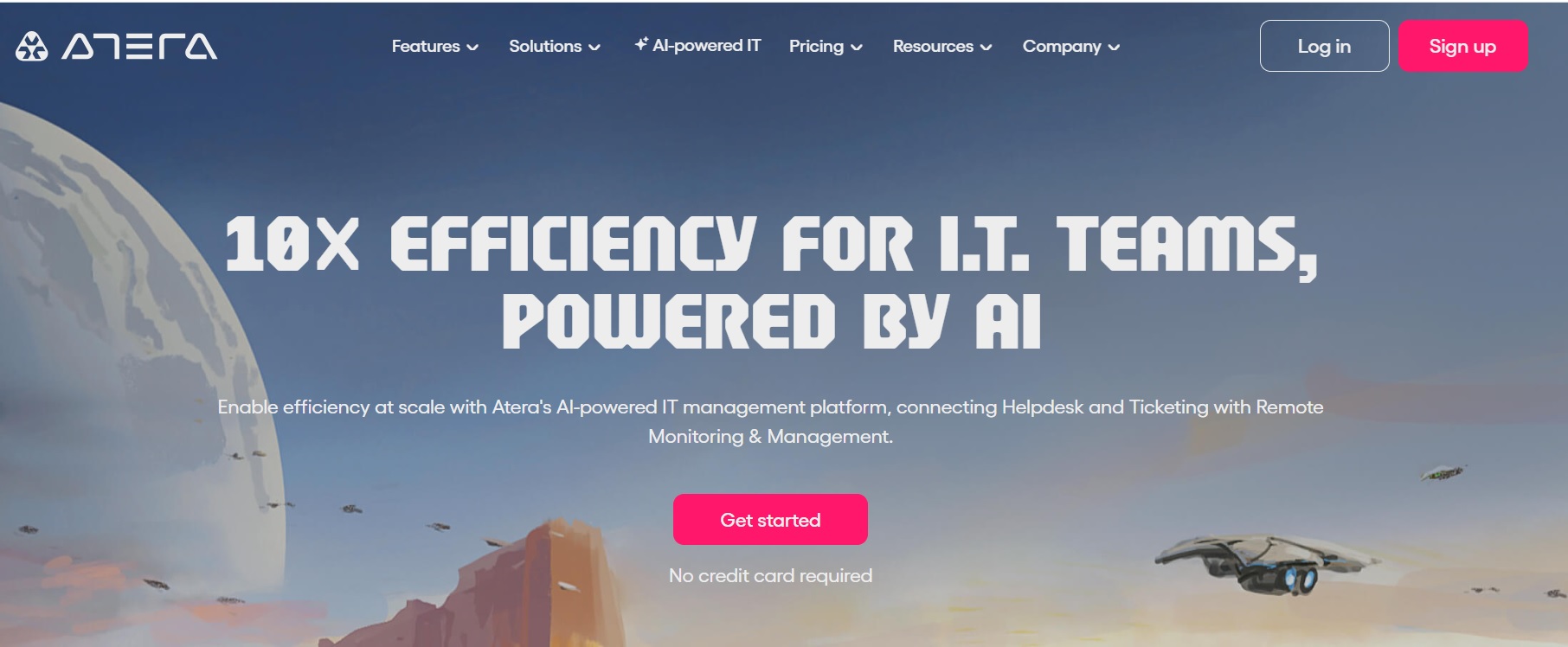
Atera is a cloud-based IT management platform that helps IT service providers and MSPs deliver remote support, monitoring, and automation to their clients.
Pros:
- Comes with customer support-centric features such as:
- Ticketing System that automatically creates, assigns, and prioritizes tickets based on rules and conditions.
- Remote Access for small businesses, allows agents to access and control devices remotely.
- Automation that automates tasks such as patch management, backup, and security management
- Atera also integrates with PSA, RMM, CRM, billing, and reporting tools to provide a comprehensive solution for IT service management.
Cons:
- The technician-based pricing plan is difficult to manage and may not suit all businesses.
Pricing:
Atera pricing for IT departments:
- Professional plan at $149/mo per technician
- Expert plan at $169/mo per technician
- Master plan at $199/mo per technician
- Custom Enterprise plan
Atera pricing for MSPs:
- Pro plan at $99/mo per technician
- Growth plan at $129/mo per technician
- Master plan at $169/mo per technician
- Custom Superpower plan
6. Zendesk

Zendesk is a cloud-based customer service platform that offers state-of-the-art customer support tools for businesses of all scale and type.
AI-Powered Features:
- Answer Bot – A tool that automatically responds to customer queries with relevant articles
- Content Cues – a tool that identifies gaps and opportunities in the knowledge base
- Satisfaction Prediction – A tool that predicts customer satisfaction scores based on various factors
Pros:
- Zendesk has a rich and diverse set of features that cover various aspects of customer service, such as ticketing, chat, voice, email, social media, self-service, and analytics.
- Ranks high on customer satisfaction and global customer support
Cons:
- The interface is not easy to master for all
- Limited customization and personalization options
- Relatively higher pricing compared to other tools in the market
Pricing:
- Suite team for $55 per agent per month
- Suite Growth for $89 per agent per month
- Suite team for $115 per agent per month
- Suite Enterprise – custom pricing

7. Ada
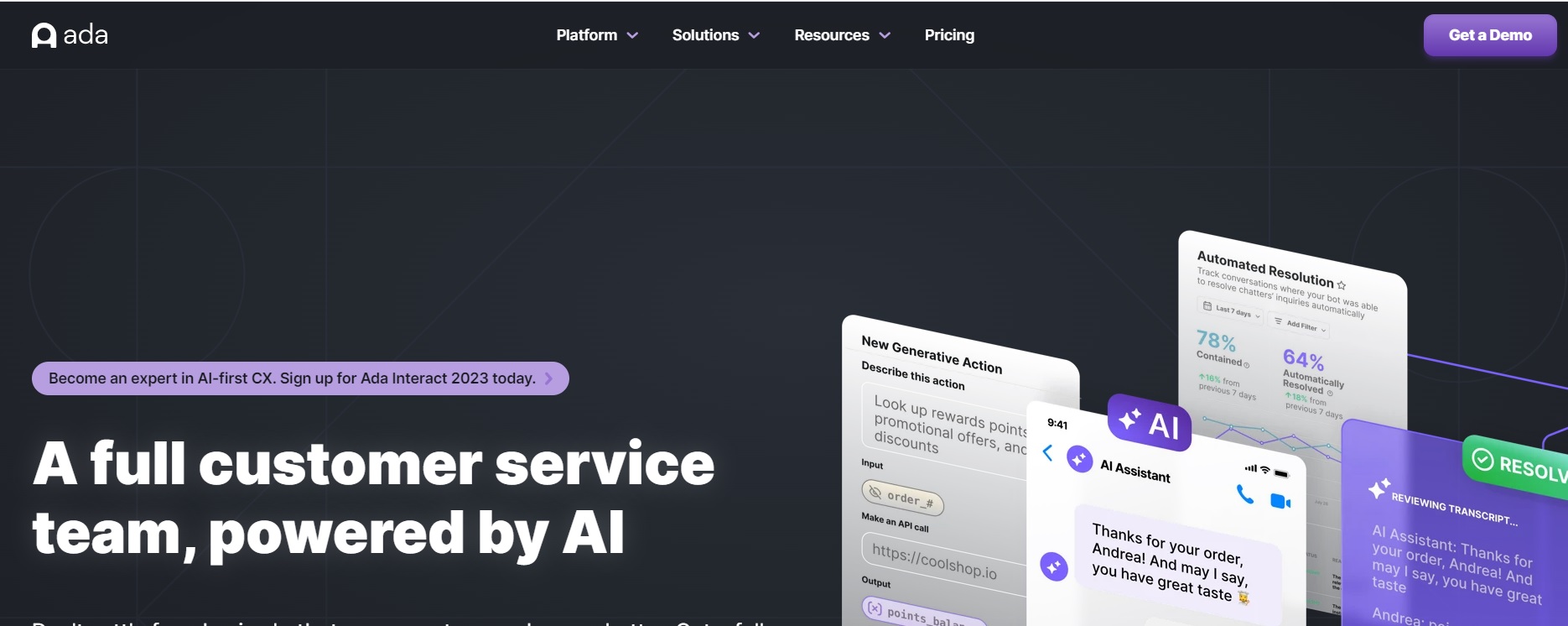
Ada is a conversational AI platform that helps customer service teams create and manage chatbots that can handle complex and personalized interactions.
Ada’s AI Features Include:
- Ada Glass to seamlessly transfers conversations from chatbots to human agents
- Ada Engage that proactively engages customers with personalized messages and offers
- Ada Translate to automatically translate conversations into over 100 languages
Pros:
- Ada’s chatbots can automate repetitive tasks and provide instant responses to common customer queries, improving efficiency.
- Ada can scale with your business, handling multiple customer conversations simultaneously
- It can provide valuable data insights and analytics to help businesses understand customer behavior and preferences
- Supports multiple languages, making it suitable for businesses with a global customer base
Cons:
- While efficient for routine inquiries, Ada’s chatbots may struggle with complex or highly personalized issues that require human intervention
- Implementing an AI chatbot like Ada can be time-consuming and may require significant training and customization
- Depending on the scale and complexity of implementation, the cost of Ada’s services can be relatively high
Pricing:
On request
8. Zoho Desk
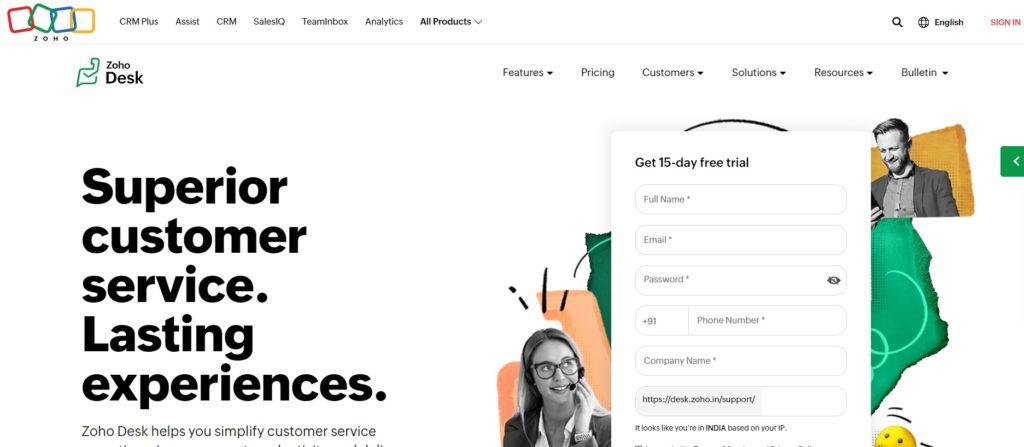
Zoho Desk is an easy-to-use web-based help desk software that uses AI to help customer service teams provide better support and insights.
AI Features of Zoho Desk:
- Zia – A virtual assistant tool for agents and customers, providing suggestions, solutions, and insights
- Zia Voice – A tool that enables voice-based interactions with Zia, the virtual assistant
- Zia Skills – A tool that allows users to create custom skills for Zia using natural language processing.
Pros:
- Zoho is known for its easy-to-use software that do not require much hand-holding
- Zoho has a top-notch customer service with great impetus on customer experience
- It easily integrates with other Zoho products and also third-party tools such as Slack, Mailchimp, Zapier, etc. that your business could be already using
Cons:
- Although a web-based app, Zoho Desk does not offer a desktop version. It remains a browser-based tool, which could be hampering productivity for some teams.
- The canned messages offered by Zia don’t work when using the app via a mobile device.
- To leverage the bet of Zoho Desk, one must upgrade to the Enterprise plan which is expensive and beyond the reach of most businesses.
Pricing:
- Express: $7 up to 5 users
- Standard: $14 up to 5 users
- Professional: $23
- Enterprise: $40
9. Kustomer
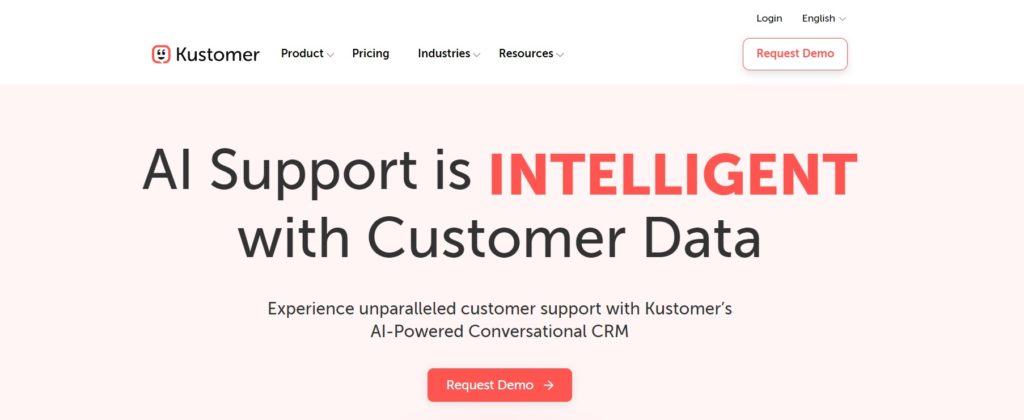
Kustomer is a customer service CRM platform that helps customer service teams provide omnichannel support across email, phone, chat, social media, and more.
Kustomer’s AI Features:
- Kustomer IQ – Natural language processing and machine learning based tool to automate tasks, suggest responses, and provide insights.
- Kustomer Chat – Live chat and chatbot interaction tool
- Kustomer Voice – Voice-based interaction tool
Pros:
- Omni-channel customer support system
- Customizable support workflows
- Complex routing capabilities for work distribution
Cons:
- Kustomer Chat is capable but lacks a visual or tree-like interface to create workflows making it complicated for users
- LImited visibility into how business rules could affect customer conversations under a given set of conditions.
Pricing:
- Enterprise – $89
- Ultimate – $139
10. Intercom
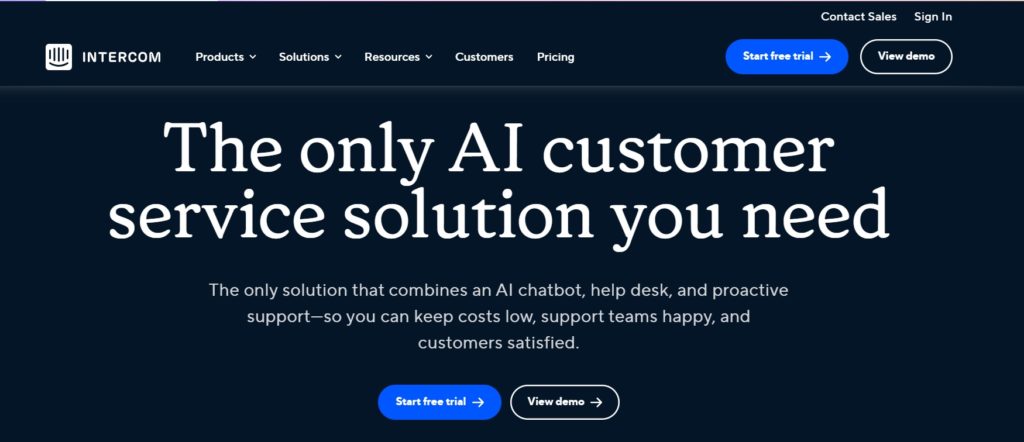
Intercom is a conversational platform that helps customer service teams engage with customers through personalized messages and chatbots. Most of the popular brands use it as a chatbot tool that interacts with users and for driving the initial conversation.
Intercom’s AI Features:
- Custom Bots – Tool for qualifying leads, book meetings, and collect feedback
- Resolution Bot – Tool for answering FAQs and resolve customer issues
- Product Tours – Customer onboarding and education tool
Pros:
- Provides detailed customizable data about customer interactions and ratings
- Robust feature set ideal fro startups and enterprises
- Value for money pricing
- Customer service that delivers great customer experience
Cons:
- Customer segmentation can be tricky for new users
- While the knowledge base is exhaustive, it can sometimes be daunting to find the right answer
- Some technical issues which are still being reported as incomplete
Pricing:
- Starter – $74 per month
- Pro and Premium – Custom pricing

11. Qualtrics
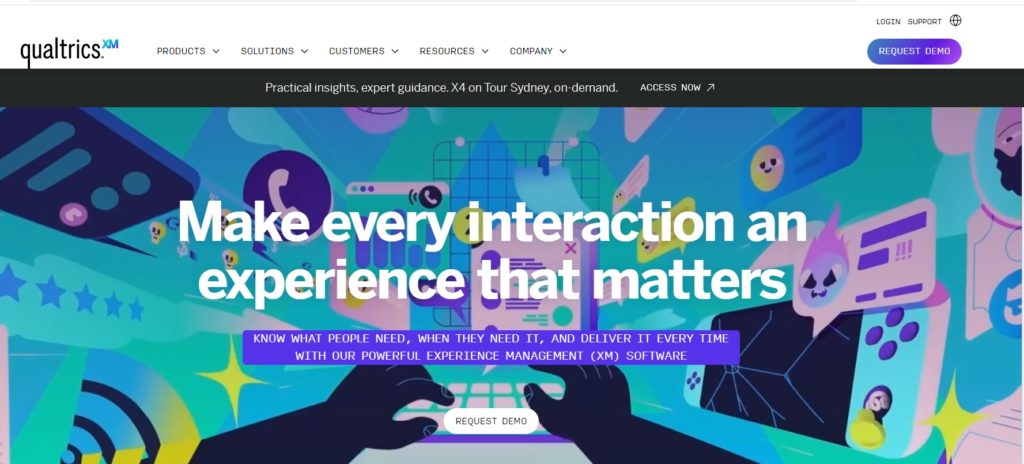
Qualtrics is a cloud-based customer experience management platform that provides tools for collecting, analyzing, and acting on customer, employee, product, and brand feedback. Although primarily used for running surveys, Qualtrics can be a powerful tool to understand customer feedback, their pain points, and feedback.
Pros:
- It is a versatile research platform with an easy-to-use interface
- It offers powerful analytics that give more insights into customer sentiments
- Automation ad workflows for sending reminders, analyzing feedback responses, and so on.
Cons:
- Pricing can be expensive for small teams and startups
- Requires extensive set up ven to run basic surveys
Pricing:
On demand
Counting on AI for Customer Service
We know for a fact that customer service is the function that is most impacted or influenced by Ai. While AI tools can help automate tasks, improve efficiency, and enhance customer satisfaction at scale, not all tools are guaranteed to deliver these results.
Some might work better than the rest. Some might suit your needs, while others might just be a weak tool in your toolkit. Equipping your business with the right AI tool, especially for customer service in AI is quintessential. AI in Customer Service leverages artificial intelligence to provide efficient, responsive, and personalized support to customers.
We hope this list helps you find the best AI tool for your customer support team.
At Kommunicate, we are envisioning a world-beating customer support solution to empower the new era of customer support. We would love to have you onboard to have a first-hand experience of Kommunicate. You can signup Here and start delighting your customers right away.
Manab leads the Product Marketing efforts at Kommunicate. He is intrigued by the developments in the space of AI and envisions a world where AI & human works together.

